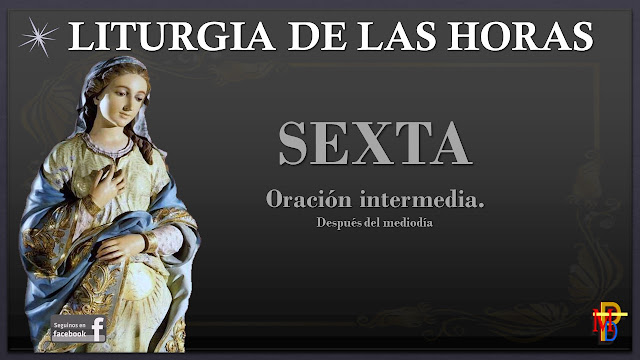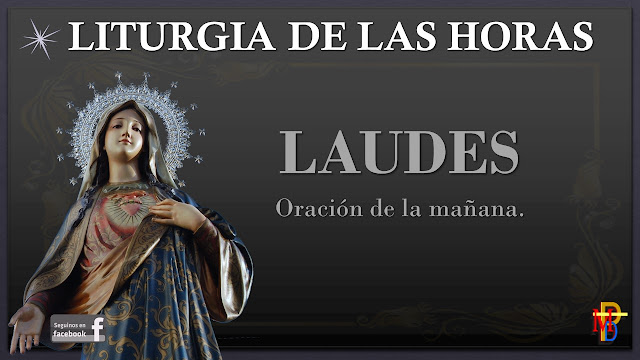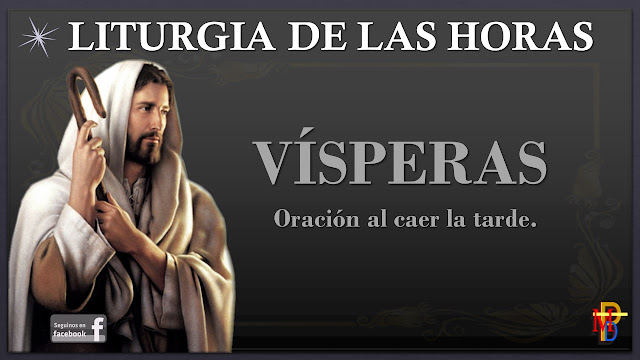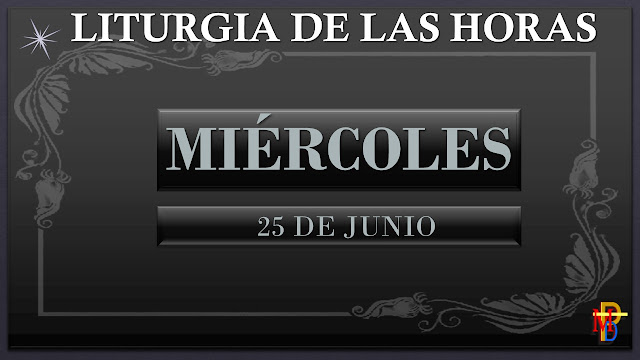lunes, 30 de junio de 2025
LITURGIA DE LAS HORAS - LAUDES
TIEMPO ORDINARIO
LITURGIA DE LAS HORAS - VÍSPERAS
TIEMPO ORDINARIO
LITURGIA DE LAS HORAS - COMPLETAS
TIEMPO ORDINARIO
domingo, 29 de junio de 2025
LITURGIA DE LAS HORAS - LAUDES
TIEMPO ORDINARIO
LITURGIA DE LAS HORAS - VÍSPERAS
TIEMPO ORDINARIO
LITURGIA DE LAS HORAS - COMPLETAS
TIEMPO ORDINARIO
sábado, 28 de junio de 2025
Cada 29 de junio se celebra la Solemnidad de San Pedro y San Pablo, Apóstoles. Ellos son esas figuras monumentales sin las cuales la Iglesia Católica, fundada por Cristo, no hubiese podido organizarse ni cobrar la forma que ha adquirido a lo largo de los siglos. Por eso, con toda justicia, a Pedro y a Pablo se les considera sus “pilares” o “columnas”. Al mismo tiempo, dado que ambos apóstoles fueron quienes fundaron la Iglesia de Roma, centro de la cristiandad, esta solemnidad es también “el día del Papa”.
LITURGIA DE LAS HORAS - OFICIO DE LECTURA
TIEMPO ORDINARIO
LITURGIA DE LAS HORAS - LAUDES
TIEMPO ORDINARIO
LITURGIA DE LAS HORAS - TERCIA
TIEMPO ORDINARIO
LITURGIA DE LAS HORAS - SEXTA
TIEMPO ORDINARIO
LITURGIA DE LAS HORAS - NONA
TIEMPO ORDINARIO
LITURGIA DE LAS HORAS - VÍSPERAS
TIEMPO ORDINARIO
LITURGIA DE LAS HORAS - COMPLETAS
TIEMPO ORDINARIO
viernes, 27 de junio de 2025
La Fiesta del Corazón Inmaculado de María fue oficialmente establecida en toda la Iglesia por el papa Pío XII, el 4 de mayo de 1944, para obtener por medio de la intercesión de María "la paz entre las naciones, libertad para la Iglesia, la conversión de los pecadores, amor a la pureza y la práctica de las virtudes". Esta fiesta se celebra en la Iglesia todos los años el sábado siguiente al segundo domingo después Pentecostés. La Fiesta de su Inmaculado Corazón nos remite de manera directa y misteriosa al Sagrado Corazón de Jesús. Y es que en María todo nos dirige a su Hijo. Los Corazones de Jesús y María están maravillosamente unidos en el tiempo y la eternidad... María, Madre de Jesús y nuestra, nos señala hoy su Inmaculado Corazón. Un corazón que arde de amor divino, que rodeado de rosas blancas nos muestra su pureza total y que atravesado por una espada nos invita a vivir el sendero del dolor-alegría.
LITURGIA DE LAS HORAS - OFICIO DE LECTURA
TIEMPO ORDINARIO
LITURGIA DE LAS HORAS - LAUDES
TIEMPO ORDINARIO
LITURGIA DE LAS HORAS - TERCIA
TIEMPO ORDINARIO
LITURGIA DE LAS HORAS - SEXTA
TIEMPO ORDINARIO
LITURGIA DE LAS HORAS - NONA
LITURGIA DE LAS HORAS - VÍSPERAS
TIEMPO ORDINARIO
LITURGIA DE LAS HORAS - COMPLETAS
TIEMPO ORDINARIO
jueves, 26 de junio de 2025
La devoción al Corazón de Jesús existió ya en los primeros tiempos de la Iglesia, pero en el siglo diecisiete, Nuestro Señor Jesucristo se apareció a Santa Margarita María de Alacoque, en Paray-le-Monial, Francia, solicitando, que se le venerase. Su Corazón estaba rodeado de llamas de amor, coronado de espinas, con una herida abierta de la cual brotaba sangre y, del interior de su corazón, salía una cruz, entre tanto le dijo: «He aquí el Corazón que tanto ha amado a los hombres, y en cambio, de la mayor parte de los hombres no recibe nada más que ingratitud, irreverencia y desprecio, en este sacramento de amor.»
LITURGIA DE LAS HORAS - LAUDES
LITURGIA DE LAS HORAS - VÍSPERAS
TIEMPO ORDINARIO
LITURGIA DE LAS HORAS - COMPLETAS
TIEMPO ORDINARIO
miércoles, 25 de junio de 2025
LITURGIA DE LAS HORAS - LAUDES
TIEMPO ORDINARIO
LITURGIA DE LAS HORAS - VÍSPERAS
TIEMPO ORDINARIO
LITURGIA DE LAS HORAS - COMPLETAS
TIEMPO ORDINARIO


















































